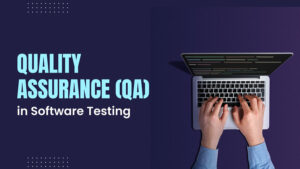How Automotive Software Consultants Help the Automotive Industry Build a Software-Defined Vehicle

The automotive sector is rapidly changing. Once defined by performance and design, vehicles of the new era are built with a special dedication to automotive software development. Software solutions have become crucial for mobility and the entire automotive world. This is why future vehicles are called software-defined vehicles.
Focus on automotive software, software architecture, computing power, software complexity, software platforms, and more automotive technologies encourages vehicle manufacturers to build new expertise. Digital transformation in the automotive industry is also fueled by software development consultants collaborating with the industry and providing professional automotive software development services.
The rise of software-defined vehicles
With the growing popularity of innovative solutions provided by Tesla and other automotive companies, automotive software has become a top priority. The industry standards now are being redefined – applications and in-vehicle systems take the center stage in designing a car.
A Software-defined vehicle phrase was coined to highlight the crucial role of software in building and promoting modern vehicles. Vehicle software is no longer a gadget or a simple solution, now is responsible for the driving experience – supports the way a vehicle is driven, how it communicates with infrastructure and other vehicles, and numerous devices. Latest developments in technology are used to improve hardware and software so the automotive industry could level up in delivering production-grade software.
Related: What is the Future of Custom Software Development?
Partners for automotive software development
While the pace of gathering software development talent and building internal expertise is impressive, the vehicle industry creating new mobility needs help. By joining forces with top automotive software companies ensuring proficiency in building software products in vehicle domains, automotive enterprises can accelerate the process of becoming technology companies.
According to Grape Up, one of these experts in consulting and building automotive software, vehicle companies still need help in creating AI-based software, cloud-based solutions, connected services, Big Data, and machine learning solutions.
Grape Up works with established mobility companies, including automotive and insurance markets, and enables them to leverage cloud services by building advanced cloud platforms. Once creating infrastructure for software development, the companies can focus on designing and developing shared mobility and connected car features. Along with delivering production-ready automotive software, Grape Up empowers its clients to build effective software development processes and introduce the best practices for greater efficiency.
Building automotive cloud
Cloud-based solutions ensure resiliency, security, and safety. Modern software needs a robust ecosystem and the main players in the automotive industry build cloud infrastructures to create an environment for their software development teams and enable fast and seamless development of a broad range of vehicle solutions.
The automotive cloud goes beyond a single software platform, as it’s rather an approach that includes determining technologies and methodologies necessary to deliver a software-defined vehicle to the market.
Automotive companies decide to build multi-cloud strategies and hybrid systems to build a reliable cloud infrastructure, avoid vendor lock-in, and have easy migration scenarios. The automotive industry chooses cloud providers such as AWS, Azure, VMware, OpenStack, Kubernetes, and sometimes an open technology platform.
Related: Top 7 Ways to Accelerated Software Development
Software-defined vehicles need seamless connectivity
The future of the vehicle market is connected and fully integrated with the digital world. Vehicles have become IoT devices gathering, sharing, and exchanging huge volumes of data. Companies are prototyping the next autonomous driving services and features allowing for connecting with hardware infrastructure using vehicle data. Connected car technology enables automotive companies to improve customer experience, create new business models, and gain new revenue streams.
Software-defined vehicles provide drivers with multiple functions and services highly improving satisfaction. OTA updates allow to deliver new features and vehicle functions remotely, making a new market for 3rd party applications and continuous improvement of additional services. Vehicle-to-Cloud communication ensures better information about the situation on the road and assistance for drivers.
A software-defined vehicle is a limitless source of data. Telematics solutions ensure info about issues, bottlenecks, customer journey maps, vehicle status, and real-time alerts. Such data enables the automotive industry to deliver solutions improving client experience in real-time.
OTA upgrades fuel a software-defined vehicle
What differentiates SDVs from traditional cars is their capability to support the development of software and easy way to implement updates. The automotive industry will be changing fast and the ability to update software remotely and easily will be crucial.
Using effective over-the-air upgrades, automotive enterprises can improve modular software components, and introduce new services and features without visiting the dealership. The entire process can be performed remotely. It’s an extremely cost-effective and customer-friendly approach.
What’s the role of automotive software companies
Transforming traditional automotive into a modern software company, consulting companies help not only build crucial systems and applications but also enable their clients to build expertise and the right culture.
Technology consulting companies like Grape Up empower vehicle enterprises to build their infrastructure, select the best technologies, and develop systems and applications to meet customer needs and ensure competitive advantage.






